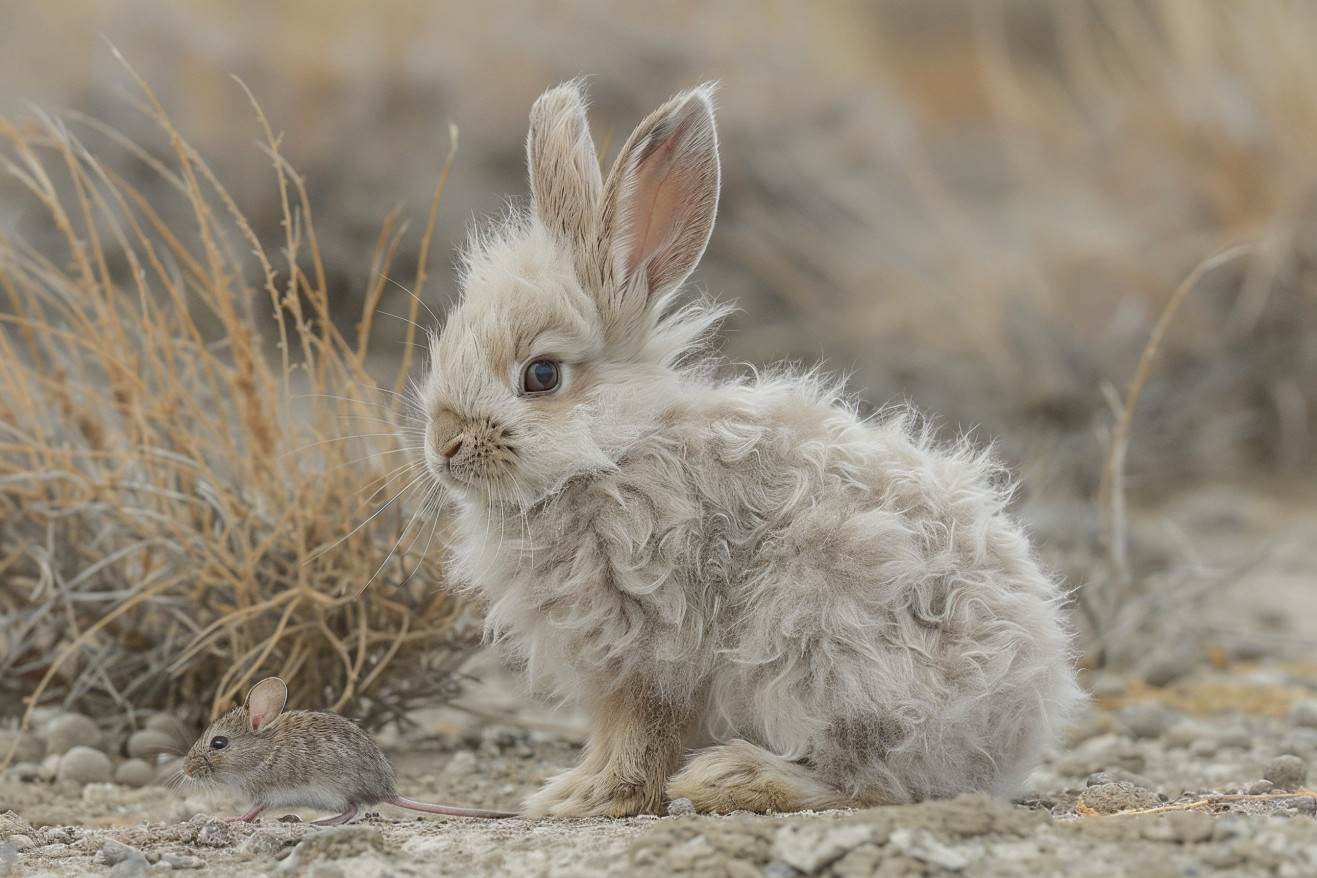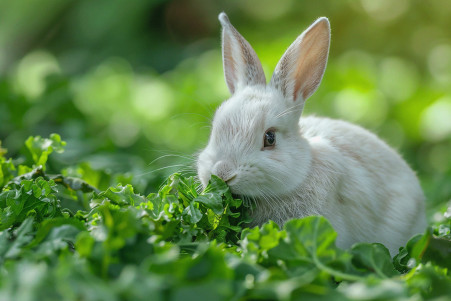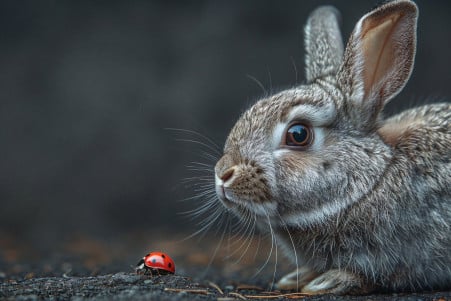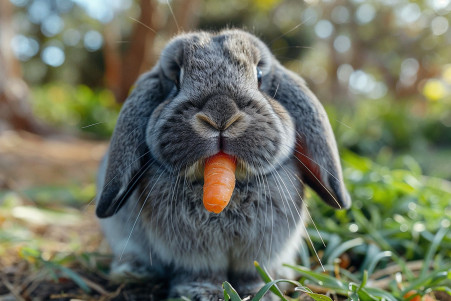Can Rabbits Eat Mice? The Shocking Truth About Rabbits and Predation
28 March 2024 • Updated 27 March 2024

Although rabbits are known for their gentle, herbivorous nature, there is some shocking evidence that rabbits may eat mice and other small animals in the wild. Rabbits are herbivores that eat a wide variety of plants, vegetables, hay and grasses. Yet, in extreme cases of starvation or malnutrition, rabbits have been known to eat mice, small birds, or even their own offspring. This is believed to be an instinctual response to a lack of certain nutrients.
We'll explore scientific research in the fields of ethology, evolutionary biology, and ecology that discusses this potential rabbit behavior. Through case studies, field observations, and evolutionary explanations, we can learn more about the conditions that would drive a rabbit to eat mice or other small prey. This disturbing behavior provides valuable information about the nuanced feeding habits of rabbits when they are under stress and facing limited resources.
Can rabbits eat mice?
What Do Wild Rabbits Eat in the Wild?
Wild rabbits eat a diet that is primarily composed of grasses, which they find in the areas where they live, called warrens. While grasses are not very nutritious, rabbits have adapted to eat a lot of grass to get the nutrition they need. Their diet changes throughout the year depending on what is in the area. In addition to grasses, they eat leafy greens, weeds, flowers, fruits, and vegetables when they are available in the spring and summer.
However, the winter months are much leaner and rabbits have to make do with a diet that includes tree bark, twigs, and evergreen needles. A number of studies referenced by BirdOculars and Whitmore Pest Control have shown that rabbits eat between 65-120 grams of food per day, depending on their size and life stage. The best time to see rabbits foraging is usually at dawn and dusk when they are most active, according to the Bunny Lady. This pattern of limited winter food leading to more foraging also helps explain why rabbits may eat meat or other animal protein when food is scarce, a behavior that will be discussed in more detail in the section on their evolution as herbivores.
Rabbits as Herbivores: Evolutionary Adaptations
Rabbits are members of the order Lagomorpha, a group of herbivorous mammals that are closely related to even-toed ungulates such as deer and goats. As reported by Live Science, rabbits are considered obligate herbivores, which means that they only eat plant-based foods.
Their digestive system has evolved to accommodate a diet that is high in fiber and plant material. This includes teeth that grow continuously, which allows them to eat and break down tough plants, and a large cecum that ferments fiber to extract nutrients, according to the RSPCA Knowledgebase. These adaptations have made it possible for rabbits to eat a diet that includes grass, leaves, vegetables, and other plant materials.
In addition, rabbits have evolved to have long legs and the ability to run fast to escape predators while they are foraging for food, Live Science explains. Their herbivorous diet also means that they can run fast and are always on the lookout for danger. On the other hand, PetsRadar points out that feeding rabbits a diet that includes meat can lead to health problems because their digestive systems can't handle the high levels of protein.
Unusual Incidents of Rabbits Eating Meat
Although rabbits are herbivores, there have been some unusual incidents of rabbits eating meat or other animal products. ZME Science reports that researchers have observed hares in Canada's Yukon Territory eating carcasses, including the flesh of their own species and even their predator, the lynx. This is believed to be a way for the hares to get more protein in their diet during the harsh Canadian winters, when food is scarce.
Some rabbit owners have also seen their pet rabbits eat worms, insects, small animals such as mice and birds, and even dog food, as mentioned by PetRabbitWorld. However, the long-term effects of rabbits eating meat are unknown, and it's generally not advised since rabbits are not built to process a high-protein diet.
While these incidents of rabbits acting like carnivores are rare, they show the complex and sometimes unexpected ways that rabbits may forage when they are in situations of extreme hunger or malnutrition. The potential health problems with this type of diet will be discussed in more detail in the next section.
Health Risks of Giving Rabbits Meat
Rabbits should not be given meat, eggs, or dairy because their digestive systems are adapted to a low-fat, high-fiber plant-based diet. Oxbow Animal Health states that animal products can lead to digestive problems, gastrointestinal upset, obesity, and disruption of the gut microbiome in rabbits.
One of the most worrisome issues that can result from a diet that includes meat is protein poisoning, which is also known as "rabbit starvation." According to Wikipedia, this is a type of acute malnutrition caused by a diet that's low in fat and carbohydrates and where most of the calories are derived from the protein found in lean meat. The symptoms that have been reported include initial nausea and weakness, followed by diarrhea and, in the worst cases, death.
Because of these health risks, the ideal rabbit diet is made up of low-fat, high-fiber plant-based foods like hay, vegetables, and herbs. PETA even notes that meat and other animal products aren't part of a healthy rabbit diet and can even hurt rabbits. By learning about the dietary requirements of rabbits, people with rabbits as pets can make sure their animals are healthy while eating a diet that's free of animal products.
How to Make Sure Your Pet Rabbit Eats a Healthy Diet
To make sure your pet rabbit eats a diet that is as close to the one it would eat in the wild as possible, you should feed it a combination of hay, fresh vegetables, and a small amount of pellets. In fact, 80-90% of a rabbit's diet should be made up of hay, and good options include timothy, orchard grass, and brome.
In addition, rabbits should be fed no more than 2 cups of vegetables per day and fruit 1-2 times per week in small amounts. There are also some foods, including beans, chocolate, and potatoes, that rabbits should never eat because they can be toxic to rabbits. Finally, rabbits should have unlimited access to fresh water and be given plenty of opportunities to exercise and play.
Feeding rabbits a diet that is as close to their natural diet as possible will help ensure that they get the nutrients they need while also being able to engage in their natural behaviors. This will help rabbits stay healthy and avoid the problems that can come with an unhealthy diet.
Conclusion: What This Means for Rabbit Diets
Although rabbits are obligate herbivores, there are a few rare cases of rabbits eating meat or animal products, which are thought to be due to extreme hunger or malnutrition. Still, a plant-based diet that includes hay, fresh vegetables, and a small amount of pellets is necessary for rabbit health and well-being. Feeding rabbits meat or animal products can result in digestive issues, protein poisoning, and other health concerns.
Understanding rabbits' natural diet and evolutionary history can help pet owners make sure they are feeding their rabbits a diet that is both balanced and appropriate. This, in turn, will help ensure that rabbits are healthy and able to exhibit their natural behaviors.


